
The Project Gutenberg EBook of Mary's Little Lamb, by Edith Francis Foster
This eBook is for the use of anyone anywhere at no cost and with
almost no restrictions whatsoever. You may copy it, give it away or
re-use it under the terms of the Project Gutenberg License included
with this eBook or online at www.gutenberg.org
Title: Mary's Little Lamb
A Picture Guessing Story for Little Children
Author: Edith Francis Foster
Release Date: September 24, 2013 [EBook #43808]
Language: English
Character set encoding: ISO-8859-1
*** START OF THIS PROJECT GUTENBERG EBOOK MARY'S LITTLE LAMB ***
Produced by Katie Hernandez, Jason Isbell and the Online
Distributed Proofreading Team at http://www.pgdp.net (This
file was made using scans of public domain works in the
International Children's Digital Library.)

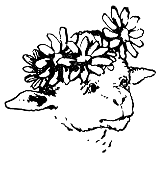


| Frontispiece | |
| Dedication | |
| How Mary found him | 9 |
| How they washed him | 15 |
| How they fed him | 21 |
| How he went to school | 27 |
| How he wouldn't jump | 33 |
| How Little Mary spun | 39 |
| How he went boating | 45 |
| How Dollabella took a ride | 51 |
| How Bossy bunted him | 57 |
| How they played hide-and-seek | 63 |
| How he saved Mary! | 69 |
| How he won a prize | 75 |
Copyright, 1901, By S. E. Cassino.
Copyright, 1903, By S. E. Cassino.
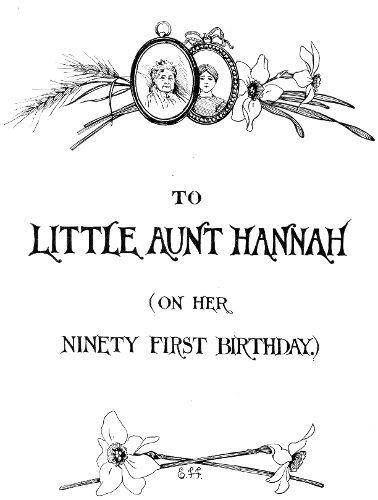


When little Mary Moffett's mother asked her to go up to the Clover Farm for some fresh
 , Mary felt a little sorry, for she was very busy making her
, Mary felt a little sorry, for she was very busy making her
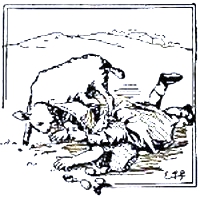
 a
a
 , but she laid down her
, but she laid down her
 and
and
 and
and
 , tied on her pink
, tied on her pink
 , and set off up the hill, with her little
, and set off up the hill, with her little
 on her
on her
 . As she was coming home she heard a queer little patter, patter, behind her. She looked back and saw something white!
. As she was coming home she heard a queer little patter, patter, behind her. She looked back and saw something white!
 felt a wee bit afraid, and began to run but her
felt a wee bit afraid, and began to run but her
 struck a
struck a
 and down she tumbled on her
and down she tumbled on her
 ! Before she could get up something soft and woolly was rubbing gently against her
! Before she could get up something soft and woolly was rubbing gently against her
 , saying "Ba-a-a!" "Oh you darling lamb!" cried Mary, hugging it—and the little
, saying "Ba-a-a!" "Oh you darling lamb!" cried Mary, hugging it—and the little
 snuggled close, and said "Ba-a-a! Take me home with you, little Mary."
snuggled close, and said "Ba-a-a! Take me home with you, little Mary."
 was astonished.
13"Whose lamb is it?" she asked. "Oh Mother,
was astonished.
13"Whose lamb is it?" she asked. "Oh Mother,
 I think it's just a wild lamb! Mayn't I keep it?" begged
I think it's just a wild lamb! Mayn't I keep it?" begged
 . But Mother said she must ask Farmer Clover if it was one of his
. But Mother said she must ask Farmer Clover if it was one of his
 , first. So back they went, and found
, first. So back they went, and found
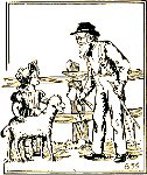 Farmer Clover mending his
Farmer Clover mending his
 and Mary asked him. But there were two big tears in her
and Mary asked him. But there were two big tears in her
 —she did so want that dear
—she did so want that dear
 —and the kind old
—and the kind old
 saw them. "Well, yes," he said, "that's my lamb—but it's an extra one, that I haven't any room for. If I knew anybody who would be willing to take it and treat it well—" "Oh, Mr. Clover!" cried
saw them. "Well, yes," he said, "that's my lamb—but it's an extra one, that I haven't any room for. If I knew anybody who would be willing to take it and treat it well—" "Oh, Mr. Clover!" cried
 , her eyes dancing, now, and her
, her eyes dancing, now, and her
 dancing, too. "I'd be willing! I'd treat it well! May I have it?" So Mary and the little
dancing, too. "I'd be willing! I'd treat it well! May I have it?" So Mary and the little
 went dancing home together. And kind old
went dancing home together. And kind old
 watched them and laughed till his
watched them and laughed till his
 danced in his
danced in his
 , and his
, and his
 danced on his
danced on his
 .
.
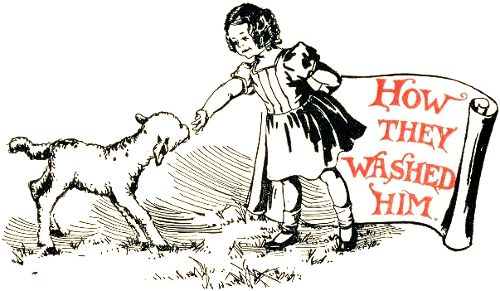
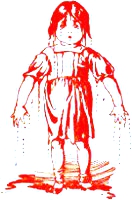
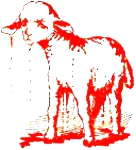
|
|
II. |
"Mother! Mother!" cried little Mary, running into the
 . "Mr. Clover says he doesn't
. "Mr. Clover says he doesn't
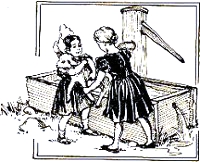 need this
need this
 —it's extra—and I may have it for my very own!" Yes, now it was Mary's little lamb—and how they loved each other! They went together everywhere—in the
—it's extra—and I may have it for my very own!" Yes, now it was Mary's little lamb—and how they loved each other! They went together everywhere—in the
 and the
and the
 , and over to Grandfathers, to play with little Aunt Hannah. Mary's Aunt Hannah was only three years older than
, and over to Grandfathers, to play with little Aunt Hannah. Mary's Aunt Hannah was only three years older than
 herself and they played together all the time. The two little
herself and they played together all the time. The two little
 thought the
thought the
 was beautiful, but it was not very clean. "I don't want a dirty, dusty little lamb," said Mary; "I want a nice, clean, white lamb." "Then we must wash it." said little
was beautiful, but it was not very clean. "I don't want a dirty, dusty little lamb," said Mary; "I want a nice, clean, white lamb." "Then we must wash it." said little
 . "Father washes all his
. "Father washes all his
 in the
in the
 every spring." Out by the
every spring." Out by the
 stood the
stood the
 with the big wooden
19
with the big wooden
19
 where the
where the
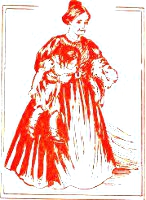
 drank. The
drank. The
 was full of water, standing in the
was full of water, standing in the
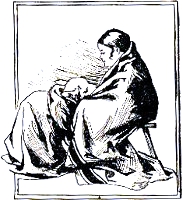
 . Mary leaned over the edge and dipped her
. Mary leaned over the edge and dipped her
 . "It's nice and warm," she said. "Now, dear little
. "It's nice and warm," she said. "Now, dear little
 jump right in!" But the lamb wouldn't jump—so Mary and little Aunt Hannah lifted him, and dropped him into the
jump right in!" But the lamb wouldn't jump—so Mary and little Aunt Hannah lifted him, and dropped him into the
 . Then they rubbed him with
. Then they rubbed him with
 , and squeezed his
, and squeezed his
 with their
with their
 . The poor little lamb didn't like it, and kept trying to get out—till, as
. The poor little lamb didn't like it, and kept trying to get out—till, as
 tried to hold him her
tried to hold him her
 slipped and in she fell,
slipped and in she fell,
 first! Oh, how she screamed! And
first! Oh, how she screamed! And
 screamed, too, and the
screamed, too, and the
 cried "Ba-a-a!" as loud as he could. Little Aunt Hannah's mother came running from the
cried "Ba-a-a!" as loud as he could. Little Aunt Hannah's mother came running from the
 fished them out of the water, and carried them into her
fished them out of the water, and carried them into her
 one under each
one under each
 . There she rubbed them dry, wrapped them both in
. There she rubbed them dry, wrapped them both in
 and set them by the
and set them by the
 , to get warm.
, to get warm.
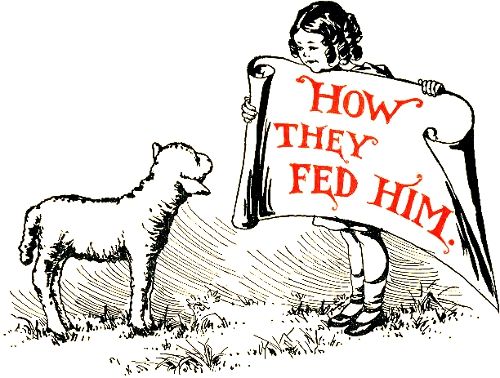
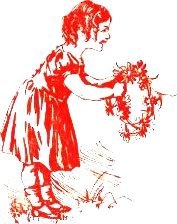

III. |
Mary's lamb was too young to eat
 , as old
, as old
 do. He wanted milk, but he did not know how to drink from a
do. He wanted milk, but he did not know how to drink from a
 . He was just a baby sheep, you see. So Mary's
. He was just a baby sheep, you see. So Mary's
 found an old tin
found an old tin
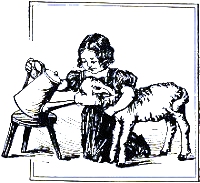
 and filled it with warm new milk. Then she tied a
and filled it with warm new milk. Then she tied a
 over the
over the
 , and
, and
 held it while the little
held it while the little
 sucked up every drop of the milk. Three times a day they filled the
sucked up every drop of the milk. Three times a day they filled the
 , and he drank it all, while Mary tilted it up for him. One day
, and he drank it all, while Mary tilted it up for him. One day
 and little
and little
 went up Clover
went up Clover
 to pick
to pick
 for their mothers to put in
for their mothers to put in
 . They took their luncheon in the berry-
. They took their luncheon in the berry-
 , and each had a tin
, and each had a tin
 to pick into. Mary's
to pick into. Mary's
 went too, and of course he would want his luncheon, so
went too, and of course he would want his luncheon, so
 carried the old
carried the old
 in a
in a
 . When the
. When the
 and
and
 were full
25 of
were full
25 of
 , they started home. Along the roadside grew white
, they started home. Along the roadside grew white
 , and they made a
, and they made a
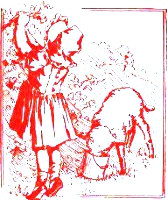
 for the lamb's
for the lamb's
 . Then Mary said "The
. Then Mary said "The
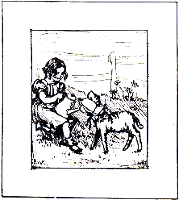
 shines so, he must be hot. He shall wear my
shines so, he must be hot. He shall wear my
 ." So they tied it snugly over his
." So they tied it snugly over his
 . Then they sat under a
. Then they sat under a
 to finish their luncheon, and afterward Mary gave the
to finish their luncheon, and afterward Mary gave the
 the rest of his milk. Two
the rest of his milk. Two
 came past, in a low
came past, in a low
 , and they laughed to see the little lamb drinking from the teapot. Mary did not notice that one
, and they laughed to see the little lamb drinking from the teapot. Mary did not notice that one
 held up a little black leather
held up a little black leather
 and pointed it at her. But next week a flat, square
and pointed it at her. But next week a flat, square
 came from the postoffice marked "For the Little Girl and Lamb who live near Clover Hill."
came from the postoffice marked "For the Little Girl and Lamb who live near Clover Hill."
 cut the
cut the
 with her
with her
 , and unfolded the
, and unfolded the
 —and what did she find inside it? A beautiful photograph of herself, feeding her
—and what did she find inside it? A beautiful photograph of herself, feeding her
 by the roadside!
by the roadside!

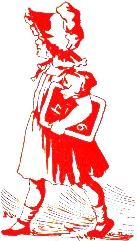
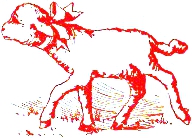
IV. |
Mary didn't like to go to school and leave her lamb at home. She knew he would not be happy all alone; and how could she study her
 and do sums on her
and do sums on her
 , without her dear little woolly
, without her dear little woolly
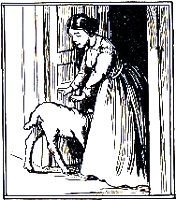
 close beside her? But schooltime came, and she had to start. If she had looked back, she would have seen the
close beside her? But schooltime came, and she had to start. If she had looked back, she would have seen the
 trotting along behind, all so pretty, with a blue
trotting along behind, all so pretty, with a blue
 on his
on his
 . He loved to follow little Mary, and he didn't know
. He loved to follow little Mary, and he didn't know
 mustn't go to school. Before he caught up with her, the
mustn't go to school. Before he caught up with her, the
 rang, the
rang, the
 all ran in, and the
all ran in, and the
 was shut; but he stood on the door-
was shut; but he stood on the door-
 and heard them singing. Then the arithmetic class began, and the
and heard them singing. Then the arithmetic class began, and the
 said: "Mary, if you had three
said: "Mary, if you had three
 , and gave one
, and gave one
 to Hannah, how many would you
31have left?" Mary was not thinking of
to Hannah, how many would you
31have left?" Mary was not thinking of
 . "Four," she said, "but please teacher, did you know I had a
. "Four," she said, "but please teacher, did you know I had a
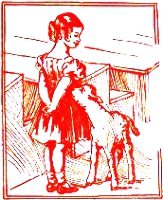
 ?" and the lamb heard her voice and called "Baa!" outside the
?" and the lamb heard her voice and called "Baa!" outside the
 , as loud as he could. "Why, there he is!" cried
, as loud as he could. "Why, there he is!" cried
 . "He must go home," said the teacher; and she opened the
. "He must go home," said the teacher; and she opened the
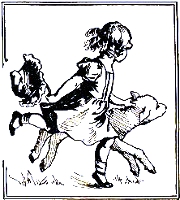
 to send him away. But the little
to send him away. But the little
 came right in, and ran to
came right in, and ran to
 , so glad to see her again! "Oh, please let him stay!" said she: "I am sure he will be good!" But all the other
, so glad to see her again! "Oh, please let him stay!" said she: "I am sure he will be good!" But all the other
 laughed—it was so funny to see a lamb in school—and the
laughed—it was so funny to see a lamb in school—and the
 had to turn him out. But the
had to turn him out. But the
 would not go home. He wanted to stay near Mary; So he waited on the
would not go home. He wanted to stay near Mary; So he waited on the
 and every time he heard her voice he cried "Ba-a-a!" At last the
and every time he heard her voice he cried "Ba-a-a!" At last the
 said
said
 must take him home; so she put away her
must take him home; so she put away her
 , and the little
, and the little
 jumped and danced, he was so happy, as they ran home together.
jumped and danced, he was so happy, as they ran home together.
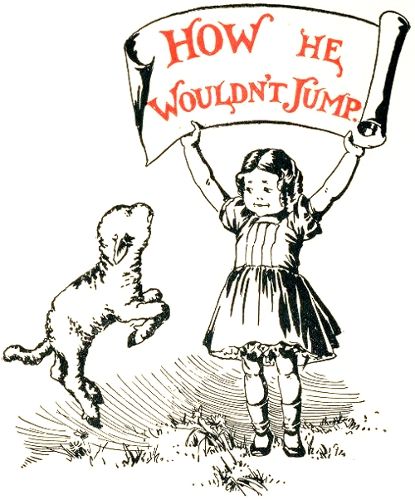
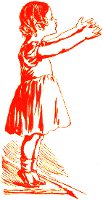
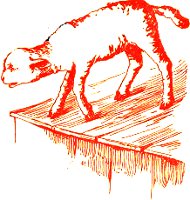
V. |
All the week the little lamb had to stay at home while Mary went to
 ; but on Saturday they had such good times! First,
; but on Saturday they had such good times! First,
 had her tasks to do. She wiped all the
had her tasks to do. She wiped all the
 and
and
 and
and
 , dusted the
, dusted the
 and made her own
and made her own
 . Then she went out to play. The nicest place to "play house" was the
. Then she went out to play. The nicest place to "play house" was the
 of a
of a
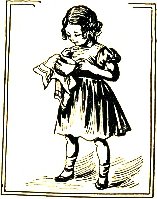
 by the
by the
 . Mary and little Aunt Hannah climbed up by the
. Mary and little Aunt Hannah climbed up by the
 , with their
, with their
 and
and
 but the
but the
 couldn't climb. They tried to carry him, but he was too heavy—and he kicked, too. So they took him up on the
couldn't climb. They tried to carry him, but he was too heavy—and he kicked, too. So they took him up on the
 in the
in the
 and dropped him out of a
and dropped him out of a
 onto the
onto the
 . Then they all had a good time playing "party", with some caraway
. Then they all had a good time playing "party", with some caraway
 and a little
and a little
 of milk. But at noon, when
37Mary's Mother blew the dinner-
of milk. But at noon, when
37Mary's Mother blew the dinner-
 , the lamb couldn't get down! They couldn't lift him up to the
, the lamb couldn't get down! They couldn't lift him up to the
 , and he was afraid to jump to the ground. Little Aunt Hannah stood on the
, and he was afraid to jump to the ground. Little Aunt Hannah stood on the

 , but could not reach him. Then they brought out armfuls of
, but could not reach him. Then they brought out armfuls of
 and made a big soft
and made a big soft
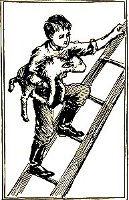
 and
and
 stood on the
stood on the
 and tried to push him off into the
and tried to push him off into the
 but he wouldn't budge. "Come to dinner, children," called Mary's
but he wouldn't budge. "Come to dinner, children," called Mary's
 . "It is getting cold." "Oh dear!" said little Mary, almost crying. "He'll have to stay up here and starve! But he's had three
. "It is getting cold." "Oh dear!" said little Mary, almost crying. "He'll have to stay up here and starve! But he's had three
 , anyway." At last
, anyway." At last
 big brother came out to find them. He laughed when he saw the
big brother came out to find them. He laughed when he saw the
 and the
and the
 but he went for a
but he went for a
 , and very quickly brought the little
, and very quickly brought the little
 safely down to the ground. Then they all went in and had their dinner together.
safely down to the ground. Then they all went in and had their dinner together.
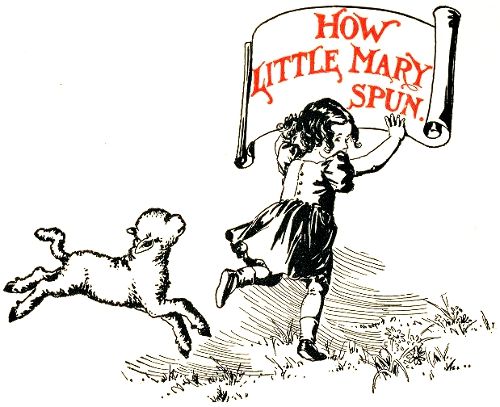

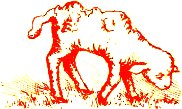
VI. |
"When my lamb is big enough" said Mary to little Aunt Hannah, "my father will shear him with the
 , like the old
, like the old
 and Mother will teach me to spin, and knit the wool; and so my little lamb will give me my
and Mother will teach me to spin, and knit the wool; and so my little lamb will give me my

 and
and
 ." "Let's shear him now." said
." "Let's shear him now." said
 . "I can teach you to knit." "Well." said Mary. "He is very little—but we will only take a little of his
. "I can teach you to knit." "Well." said Mary. "He is very little—but we will only take a little of his
 ." So she got the
." So she got the
 , and they cut some wool from his
, and they cut some wool from his
 . But they found it must first be spun into
. But they found it must first be spun into
 —and they didn't know how: so they went to ask Mary's
—and they didn't know how: so they went to ask Mary's
 . She laughed at the poor little
. She laughed at the poor little
 with the big bare spots in his pretty white
with the big bare spots in his pretty white
 . "If you are in such a hurry for
. "If you are in such a hurry for
 and
and
 ," she said, "we will begin them
43at once. First, you must learn to spin." So she brought out the big
," she said, "we will begin them
43at once. First, you must learn to spin." So she brought out the big
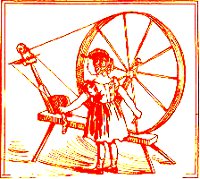
 and some tiny soft
and some tiny soft
 of wool and showed her how to spin the rolls into
of wool and showed her how to spin the rolls into
 . Mary liked to walk backward and forward, and twirl the great
. Mary liked to walk backward and forward, and twirl the great
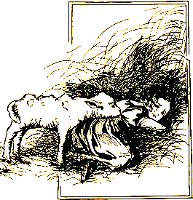
 with a
with a
 ; but her yarn was all uneven, and kept snarling and breaking. Soon she grew tired—and cross, too, and then the
; but her yarn was all uneven, and kept snarling and breaking. Soon she grew tired—and cross, too, and then the
 snarled worse than ever. As last
snarled worse than ever. As last
 gave the
gave the
 a great whirl, as hard as she could, and ran off to the
a great whirl, as hard as she could, and ran off to the
 . There she hid in the
. There she hid in the
 and cried, until the little
and cried, until the little
 found her and rubbed his
found her and rubbed his
 against her
against her
 . Then she stopped crying to laugh, his ragged
. Then she stopped crying to laugh, his ragged
 looked so funny! Pretty soon she went back to the
looked so funny! Pretty soon she went back to the
 and said she was sorry for being cross. Then
and said she was sorry for being cross. Then
 gave her a nice
gave her a nice
 of yarn and some
of yarn and some
 and
and
 taught her to knit a
taught her to knit a
 .
.
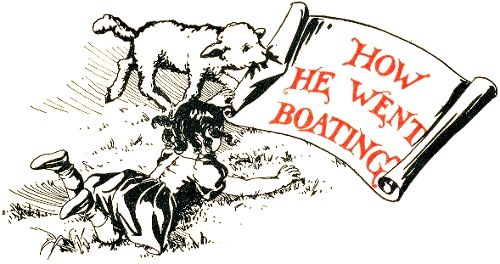
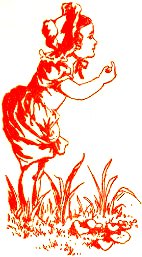

VII. |
When the time really came to wash and shear the
 , Mary's
, Mary's
 said the lamb wasn't big enough to spare any more
said the lamb wasn't big enough to spare any more
 —but he did get washed in the
—but he did get washed in the

 . Mary and little Aunt Hannah went down in the meadow to gather cowslips—not for the pretty
. Mary and little Aunt Hannah went down in the meadow to gather cowslips—not for the pretty
 but to boil in a
but to boil in a
 for dinner. They took off their
for dinner. They took off their
 and
and
 and splashed about in the wet
and splashed about in the wet
 , filling their
, filling their
 with
with
 . They picked some tall blue
. They picked some tall blue
 too, and pulled sweet-flag to eat. To get the sweet
too, and pulled sweet-flag to eat. To get the sweet
 , they had to cross a little
, they had to cross a little
 over the brook. The
over the brook. The
 followed them, but he stepped on a loose
followed them, but he stepped on a loose
 , and it tipped him off into the water! It wasn't deep enough to be over his
, and it tipped him off into the water! It wasn't deep enough to be over his
 , but he waded the wrong way and scrambled out on a little
, but he waded the wrong way and scrambled out on a little
 in the
49
in the
49
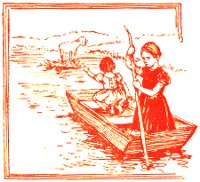 middle of the
middle of the
 . They couldn't coax him to wade ashore;—he didn't like water, and would only shake his
. They couldn't coax him to wade ashore;—he didn't like water, and would only shake his
 and say "Ba-a-a! No-o-o!" "We must build a
and say "Ba-a-a! No-o-o!" "We must build a
 for him" said
for him" said
 . "No," said
. "No," said
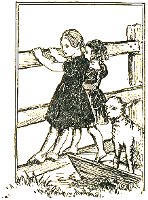
 "we will get the boat. The
"we will get the boat. The
 keep it at the mill." They followed the brook up to the
keep it at the mill." They followed the brook up to the
 and untied the
and untied the
 . There were no
. There were no
 , but they found a long
, but they found a long
 and pushed it along to the
and pushed it along to the
 . The little
. The little
 was very glad to jump in with them. But they could not push the
was very glad to jump in with them. But they could not push the
 ashore, for the water ran too fast. So they floated along, dipping their
ashore, for the water ran too fast. So they floated along, dipping their
 in the water, and watching the little
in the water, and watching the little
 swimming below, till they ran into a
swimming below, till they ran into a
 across the brook. Then they climbed ashore and went back for their
across the brook. Then they climbed ashore and went back for their
 and
and
 . "Oh, you funny lamb!" said Mary, "What good times you do make us have!"
. "Oh, you funny lamb!" said Mary, "What good times you do make us have!"


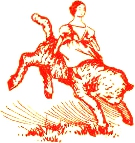
VIII. |
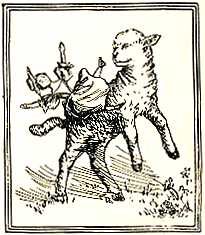 Dollabella, Mary's biggest doll, had had the measles, but she was getting better. "When people get better" said
Dollabella, Mary's biggest doll, had had the measles, but she was getting better. "When people get better" said
 , "they always go to ride." So she tried to give her
, "they always go to ride." So she tried to give her
 a ride on the
a ride on the
 's back, but he danced up and down and she fell off. Then Mary took a
's back, but he danced up and down and she fell off. Then Mary took a
 and tied her on, so when the
and tied her on, so when the
 danced again he couldn't shake
danced again he couldn't shake
 off. He didn't like that, so he thought he would run away from her, and off he went! The
off. He didn't like that, so he thought he would run away from her, and off he went! The
 was shut, but he squeezed through a gap in the
was shut, but he squeezed through a gap in the
 , and tore Dollabella's
, and tore Dollabella's
 on a
on a
 . Mary squeezed through the gap, too, and her
. Mary squeezed through the gap, too, and her
 caught on the
caught on the
 , and tore a great big three-cornered
, and tore a great big three-cornered
 . The
. The
 ran across a field and jumped over a
ran across a field and jumped over a
 into the
into the
 and Mary ran after him, laughing.
55
and Mary ran after him, laughing.
55
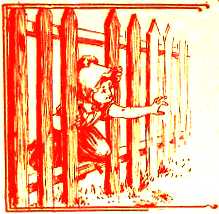 Dollabella's
Dollabella's
 fell off her
fell off her
 , and so did Mary's
, and so did Mary's

 . The
. The
 of the
of the
 caught her
caught her
 and tangled them and almost pulled the
and tangled them and almost pulled the
 from the lamb's back. At last they came out into a
from the lamb's back. At last they came out into a
 field and saw Farmer Clover at work with his
field and saw Farmer Clover at work with his
 . "Hello!" said he. "Who's running away—you or your lamb?" "Oh, we aren't running away," said
. "Hello!" said he. "Who's running away—you or your lamb?" "Oh, we aren't running away," said
 , all out of breath. "We are just giving my
, all out of breath. "We are just giving my
 a ride. She is sick!" "Well, that's a pretty fast ride for anybody that's sick!" said
a ride. She is sick!" "Well, that's a pretty fast ride for anybody that's sick!" said
 . "Now I am going to the
. "Now I am going to the
 , to get a
, to get a
 of molasses. Don't you want to ride home in my
of molasses. Don't you want to ride home in my
 ?" Mary and the
?" Mary and the
 were tired, and glad to have a ride—and I think the poor sick
were tired, and glad to have a ride—and I think the poor sick
 must have been just as glad. But when they got home
must have been just as glad. But when they got home
 had to take a
had to take a
 and
and
 out of her
out of her
 and mend her
and mend her
 and Dollabella's too.
and Dollabella's too.
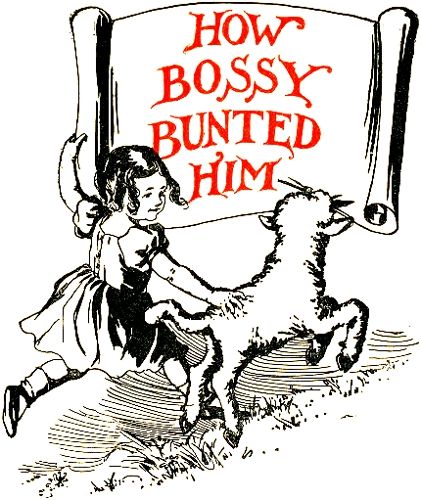
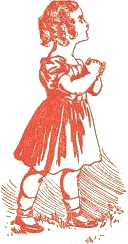
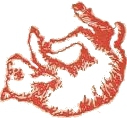
IX. |
As the lamb grew big and strong he got very frisky, too. He found out that when he ran at things with his hard little
 down and bunted them, the things would fall down. He thought that was funny, so he bunted everything. In the
down and bunted them, the things would fall down. He thought that was funny, so he bunted everything. In the
 he bunted over
he bunted over
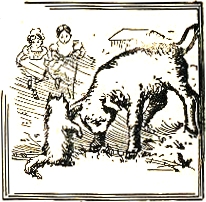
 and the
and the
 and
and
 , and nobody dared set a
, and nobody dared set a
 or
or
 on the floor. Outdoors, he ran at the
on the floor. Outdoors, he ran at the
 and
and
 , to see them flutter and scream. Once he bunted little Aunt Hannah's
, to see them flutter and scream. Once he bunted little Aunt Hannah's
 —but she didn't fall down; she stood up and cuffed him with her
—but she didn't fall down; she stood up and cuffed him with her
 , and scratched him! But
, and scratched him! But
 fell down when he bunted her, and so did
fell down when he bunted her, and so did
 , although they were bigger than the
, although they were bigger than the
 . One night he ran at Mary's father, bringing in the
. One night he ran at Mary's father, bringing in the
 , and spilled all the milk over his
, and spilled all the milk over his
 . Then Mary's
. Then Mary's
 said
61
said
61
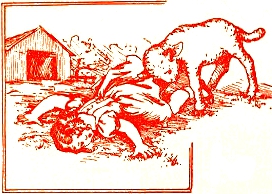 if the
if the
 didn't stop bunting he must be tied up. So
didn't stop bunting he must be tied up. So
 tried to teach him better, but he didn't understand it was naughty, and kept right on bunting. At last one day, he bunted the
tried to teach him better, but he didn't understand it was naughty, and kept right on bunting. At last one day, he bunted the
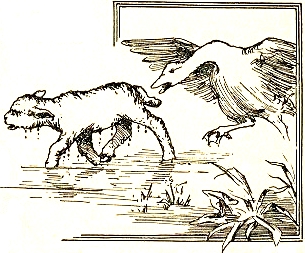
 which was tied to the
which was tied to the
 by a long
by a long
 . Now Bossy liked to bunt, too; so when the
. Now Bossy liked to bunt, too; so when the
 ran at her she put her
ran at her she put her
 down and ran at him! And she was the biggest, so it was the little
down and ran at him! And she was the biggest, so it was the little
 himself that fell down that time! First he flew right over the
himself that fell down that time! First he flew right over the
 and fell on his
and fell on his
 ,—then he rolled over and over into the duck-
,—then he rolled over and over into the duck-
 . All the
. All the
 began to flap their
began to flap their
 and quack, and the big gray
and quack, and the big gray
 hissed at him and chased him. The poor naughty little
hissed at him and chased him. The poor naughty little
 was so frightened that he ran to
was so frightened that he ran to
 , all wet and muddy, and hid his
, all wet and muddy, and hid his
 in her
in her
 . After that, he didn't bunt things any more!
. After that, he didn't bunt things any more!
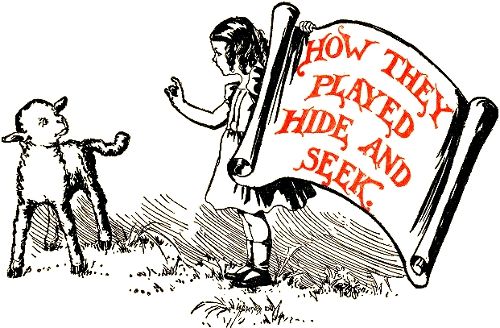
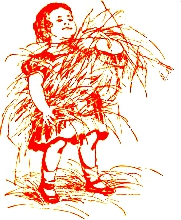
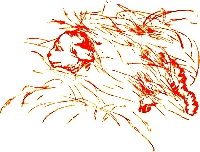
X. |
One day Mary and her lamb were playing in the
 . He would lie still as a
. He would lie still as a
 while she buried him in the
while she buried him in the
 , but when she clapped her
, but when she clapped her
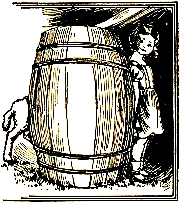
 he jumped up and ran to her like a
he jumped up and ran to her like a
 . Then
. Then
 began to pull out
began to pull out
 from the mow, and made a deep hole where they could both creep in out of sight. After supper they played hide-and-seek with
from the mow, and made a deep hole where they could both creep in out of sight. After supper they played hide-and-seek with
 . So many nice hiding-places—under the
. So many nice hiding-places—under the
 -bushes, behind the rain-
-bushes, behind the rain-
 , and around the
, and around the
 by the
by the
 . At last
. At last
 remembered her hole in the
remembered her hole in the
 and crept in, with the
and crept in, with the
 which followed her everywhere. Then they waited, keeping very still, till by and by
which followed her everywhere. Then they waited, keeping very still, till by and by
 grew sleepy—for it was almost
grew sleepy—for it was almost
 -time. She laid her
-time. She laid her
 on the
on the
 's soft neck, as they cuddled down together in their
's soft neck, as they cuddled down together in their
 , and before they
67
knew it they were fast asleep!
, and before they
67
knew it they were fast asleep!
 hunted and hunted, till she thought
hunted and hunted, till she thought
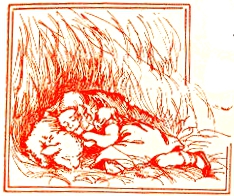
 must have gone in the
must have gone in the
 , to play a trick on her; so she went into her own
, to play a trick on her; so she went into her own

 a little vexed.
a little vexed.
 -time came and her
-time came and her
 came to the
came to the
 to call Mary in. "I guess she's gone home with Hannah," said
to call Mary in. "I guess she's gone home with Hannah," said
 , as he came from the
, as he came from the
 with his
with his
 . The
. The
 often slept together, and Mary's mother didn't hear the "I guess," so she only said "It is naughty to go without telling me. She mustn't again." So nobody knew where
often slept together, and Mary's mother didn't hear the "I guess," so she only said "It is naughty to go without telling me. She mustn't again." So nobody knew where
 was, all night! But next morning she didn't come home—she was not at
was, all night! But next morning she didn't come home—she was not at
 's—and how frightened everybody was! They hunted everywhere, and at last started to drive to the neighbor's
's—and how frightened everybody was! They hunted everywhere, and at last started to drive to the neighbor's
 . The noise of the
. The noise of the
 and of the
and of the
 trampling on the
trampling on the
 waked Mary—and how astonished everybody was, when she and the
waked Mary—and how astonished everybody was, when she and the
 came creeping out of the
came creeping out of the
 !
!

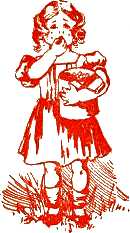

XI. |
Once little Mary and her lamb really did get lost—and something dreadful almost happened! They had been picking
 in the
in the
 up Clover
up Clover
 , and couldn't find the way out. The
, and couldn't find the way out. The
 was setting, and
was setting, and
 thought of
thought of
 and
and

 ! She was tired and hungry, too. She was eating
! She was tired and hungry, too. She was eating
 from her
from her
 , and crying, and the
, and crying, and the
 , who would not eat
, who would not eat
 and wanted his milk in the old
and wanted his milk in the old
 was crying, too—"Ba-a-a!"—when a big, tall
was crying, too—"Ba-a-a!"—when a big, tall
 with a
with a
 in his
in his
 broke through the bushes behind them. He sat down on a
broke through the bushes behind them. He sat down on a
 and stared at them, looking so white and scared that
and stared at them, looking so white and scared that
 felt sorry for him. "Did a
felt sorry for him. "Did a
 chase you?" she asked. "Oh no," said he, "It's only I'm so glad you are alive!" He didn't dare tell her he had mistaken her little brown
chase you?" she asked. "Oh no," said he, "It's only I'm so glad you are alive!" He didn't dare tell her he had mistaken her little brown
 bobbing among the
73
bobbing among the
73
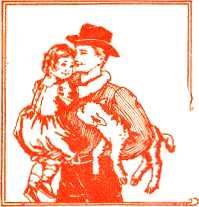
 , for a
, for a
 , and raised his
, and raised his
 to shoot it when he saw a little white
to shoot it when he saw a little white
 bobbing beside it and stopped to look closer! So her little
bobbing beside it and stopped to look closer! So her little
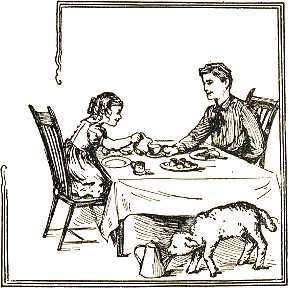
 had saved Mary's life—but she never knew it. "Now how came you up here?" the boy asked. "Are you lost?" "Oh no," said
had saved Mary's life—but she never knew it. "Now how came you up here?" the boy asked. "Are you lost?" "Oh no," said
 , winking away the
, winking away the
 , and smiling; "We aren't exactly lost—only we can't just find our
, and smiling; "We aren't exactly lost—only we can't just find our
 . And we want our supper, too." "You shall have it!" said the
. And we want our supper, too." "You shall have it!" said the
 . "You are little Mary—I know your
. "You are little Mary—I know your
 —and I'm going to carry you there, quicker than a
—and I'm going to carry you there, quicker than a
 can trot!" So he took
can trot!" So he took
 in one
in one
 and the
and the
 in the other, and the
in the other, and the
 he left hidden in the
he left hidden in the
 under a
under a
 . Then he quickly found the
. Then he quickly found the
 (it was close by, after all,) and in ten minutes they were safe home again; and Mary's
(it was close by, after all,) and in ten minutes they were safe home again; and Mary's
 thanked the big
thanked the big
 and gave them all some supper.
and gave them all some supper.
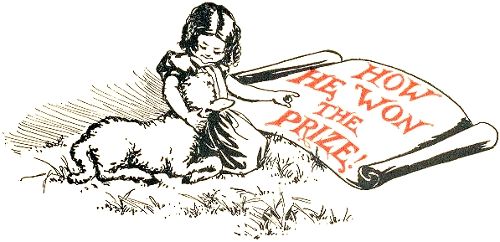
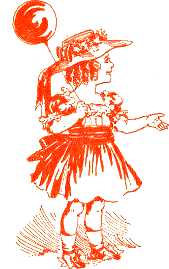

XII. |
Now Mary and the big
 with the
with the
 became great friends. He used to bring her
became great friends. He used to bring her
 in his
in his
 ; once he took her out in his
; once he took her out in his
 to gather
to gather
 ; and he promised to take her to the County Fair. Early on that day he came for her with his
; and he promised to take her to the County Fair. Early on that day he came for her with his
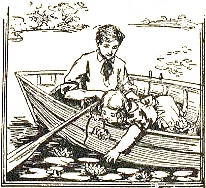
 and
and
 . Mary was all ready, in her new
. Mary was all ready, in her new
 , with
, with
 on her
on her
 . "Where is the
. "Where is the
 ?" he asked. "
?" he asked. "
 says he mustn't go," said Mary sadly, "so I shut him up in the
says he mustn't go," said Mary sadly, "so I shut him up in the
 ". "Oh but he must go!" cried the
". "Oh but he must go!" cried the
 . "He's entered—they expect him."
. "He's entered—they expect him."
 didn't understand that, but she was very glad to take her dear
didn't understand that, but she was very glad to take her dear
 with her. They walked about the Fair grounds and saw the
with her. They walked about the Fair grounds and saw the
 and
and
 and
and
 and
and
 in the
in the
 ; and visited the
; and visited the
 where the
where the
 and
and
 were, in their
were, in their
 . And everywhere
79
. And everywhere
79
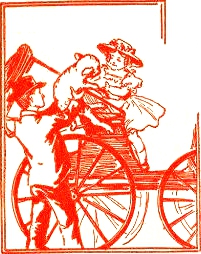 that
that
 went the
went the
 kept close beside her; and all the
kept close beside her; and all the
 looked at them and smiled. At last the
looked at them and smiled. At last the
 said, "Now we are going into the
said, "Now we are going into the
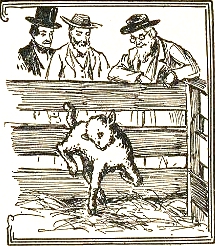
 so we will leave our
so we will leave our
 in this nice little
in this nice little
 beside all the other
beside all the other
 to wait for us." They looked at the
to wait for us." They looked at the
 and
and
 and the
and the
 and
and
 in the
in the
 . Then they found Marys
. Then they found Marys
 and
and
 and had dinner together; and afterward they saw the
and had dinner together; and afterward they saw the
 race, and the
race, and the
 go up, and heard the
go up, and heard the
 play. It was a long time before they went for the
play. It was a long time before they went for the
 . Some
. Some
 were looking at him, and just as Mary ran up they fastened a blue
were looking at him, and just as Mary ran up they fastened a blue
 on his
on his
 . "Oh, thank you! How pretty!" she said. "Hurrah!" cried the
. "Oh, thank you! How pretty!" she said. "Hurrah!" cried the
 . "Our
. "Our
 has won first prize! That means he's the best
has won first prize! That means he's the best
 in town!" "Of course!" said little
in town!" "Of course!" said little
 . "He's the best
. "He's the best
 in the whole
in the whole
 !"
!"
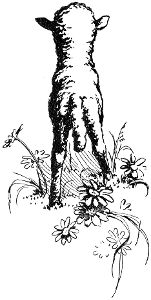
End of Project Gutenberg's Mary's Little Lamb, by Edith Francis Foster
*** END OF THIS PROJECT GUTENBERG EBOOK MARY'S LITTLE LAMB ***
***** This file should be named 43808-h.htm or 43808-h.zip *****
This and all associated files of various formats will be found in:
http://www.gutenberg.org/4/3/8/0/43808/
Produced by Katie Hernandez, Jason Isbell and the Online
Distributed Proofreading Team at http://www.pgdp.net (This
file was made using scans of public domain works in the
International Children's Digital Library.)
Updated editions will replace the previous one--the old editions
will be renamed.
Creating the works from public domain print editions means that no
one owns a United States copyright in these works, so the Foundation
(and you!) can copy and distribute it in the United States without
permission and without paying copyright royalties. Special rules,
set forth in the General Terms of Use part of this license, apply to
copying and distributing Project Gutenberg-tm electronic works to
protect the PROJECT GUTENBERG-tm concept and trademark. Project
Gutenberg is a registered trademark, and may not be used if you
charge for the eBooks, unless you receive specific permission. If you
do not charge anything for copies of this eBook, complying with the
rules is very easy. You may use this eBook for nearly any purpose
such as creation of derivative works, reports, performances and
research. They may be modified and printed and given away--you may do
practically ANYTHING with public domain eBooks. Redistribution is
subject to the trademark license, especially commercial
redistribution.
*** START: FULL LICENSE ***
THE FULL PROJECT GUTENBERG LICENSE
PLEASE READ THIS BEFORE YOU DISTRIBUTE OR USE THIS WORK
To protect the Project Gutenberg-tm mission of promoting the free
distribution of electronic works, by using or distributing this work
(or any other work associated in any way with the phrase "Project
Gutenberg"), you agree to comply with all the terms of the Full Project
Gutenberg-tm License available with this file or online at
www.gutenberg.org/license.
Section 1. General Terms of Use and Redistributing Project Gutenberg-tm
electronic works
1.A. By reading or using any part of this Project Gutenberg-tm
electronic work, you indicate that you have read, understand, agree to
and accept all the terms of this license and intellectual property
(trademark/copyright) agreement. If you do not agree to abide by all
the terms of this agreement, you must cease using and return or destroy
all copies of Project Gutenberg-tm electronic works in your possession.
If you paid a fee for obtaining a copy of or access to a Project
Gutenberg-tm electronic work and you do not agree to be bound by the
terms of this agreement, you may obtain a refund from the person or
entity to whom you paid the fee as set forth in paragraph 1.E.8.
1.B. "Project Gutenberg" is a registered trademark. It may only be
used on or associated in any way with an electronic work by people who
agree to be bound by the terms of this agreement. There are a few
things that you can do with most Project Gutenberg-tm electronic works
even without complying with the full terms of this agreement. See
paragraph 1.C below. There are a lot of things you can do with Project
Gutenberg-tm electronic works if you follow the terms of this agreement
and help preserve free future access to Project Gutenberg-tm electronic
works. See paragraph 1.E below.
1.C. The Project Gutenberg Literary Archive Foundation ("the Foundation"
or PGLAF), owns a compilation copyright in the collection of Project
Gutenberg-tm electronic works. Nearly all the individual works in the
collection are in the public domain in the United States. If an
individual work is in the public domain in the United States and you are
located in the United States, we do not claim a right to prevent you from
copying, distributing, performing, displaying or creating derivative
works based on the work as long as all references to Project Gutenberg
are removed. Of course, we hope that you will support the Project
Gutenberg-tm mission of promoting free access to electronic works by
freely sharing Project Gutenberg-tm works in compliance with the terms of
this agreement for keeping the Project Gutenberg-tm name associated with
the work. You can easily comply with the terms of this agreement by
keeping this work in the same format with its attached full Project
Gutenberg-tm License when you share it without charge with others.
1.D. The copyright laws of the place where you are located also govern
what you can do with this work. Copyright laws in most countries are in
a constant state of change. If you are outside the United States, check
the laws of your country in addition to the terms of this agreement
before downloading, copying, displaying, performing, distributing or
creating derivative works based on this work or any other Project
Gutenberg-tm work. The Foundation makes no representations concerning
the copyright status of any work in any country outside the United
States.
1.E. Unless you have removed all references to Project Gutenberg:
1.E.1. The following sentence, with active links to, or other immediate
access to, the full Project Gutenberg-tm License must appear prominently
whenever any copy of a Project Gutenberg-tm work (any work on which the
phrase "Project Gutenberg" appears, or with which the phrase "Project
Gutenberg" is associated) is accessed, displayed, performed, viewed,
copied or distributed:
This eBook is for the use of anyone anywhere at no cost and with
almost no restrictions whatsoever. You may copy it, give it away or
re-use it under the terms of the Project Gutenberg License included
with this eBook or online at www.gutenberg.org
1.E.2. If an individual Project Gutenberg-tm electronic work is derived
from the public domain (does not contain a notice indicating that it is
posted with permission of the copyright holder), the work can be copied
and distributed to anyone in the United States without paying any fees
or charges. If you are redistributing or providing access to a work
with the phrase "Project Gutenberg" associated with or appearing on the
work, you must comply either with the requirements of paragraphs 1.E.1
through 1.E.7 or obtain permission for the use of the work and the
Project Gutenberg-tm trademark as set forth in paragraphs 1.E.8 or
1.E.9.
1.E.3. If an individual Project Gutenberg-tm electronic work is posted
with the permission of the copyright holder, your use and distribution
must comply with both paragraphs 1.E.1 through 1.E.7 and any additional
terms imposed by the copyright holder. Additional terms will be linked
to the Project Gutenberg-tm License for all works posted with the
permission of the copyright holder found at the beginning of this work.
1.E.4. Do not unlink or detach or remove the full Project Gutenberg-tm
License terms from this work, or any files containing a part of this
work or any other work associated with Project Gutenberg-tm.
1.E.5. Do not copy, display, perform, distribute or redistribute this
electronic work, or any part of this electronic work, without
prominently displaying the sentence set forth in paragraph 1.E.1 with
active links or immediate access to the full terms of the Project
Gutenberg-tm License.
1.E.6. You may convert to and distribute this work in any binary,
compressed, marked up, nonproprietary or proprietary form, including any
word processing or hypertext form. However, if you provide access to or
distribute copies of a Project Gutenberg-tm work in a format other than
"Plain Vanilla ASCII" or other format used in the official version
posted on the official Project Gutenberg-tm web site (www.gutenberg.org),
you must, at no additional cost, fee or expense to the user, provide a
copy, a means of exporting a copy, or a means of obtaining a copy upon
request, of the work in its original "Plain Vanilla ASCII" or other
form. Any alternate format must include the full Project Gutenberg-tm
License as specified in paragraph 1.E.1.
1.E.7. Do not charge a fee for access to, viewing, displaying,
performing, copying or distributing any Project Gutenberg-tm works
unless you comply with paragraph 1.E.8 or 1.E.9.
1.E.8. You may charge a reasonable fee for copies of or providing
access to or distributing Project Gutenberg-tm electronic works provided
that
- You pay a royalty fee of 20% of the gross profits you derive from
the use of Project Gutenberg-tm works calculated using the method
you already use to calculate your applicable taxes. The fee is
owed to the owner of the Project Gutenberg-tm trademark, but he
has agreed to donate royalties under this paragraph to the
Project Gutenberg Literary Archive Foundation. Royalty payments
must be paid within 60 days following each date on which you
prepare (or are legally required to prepare) your periodic tax
returns. Royalty payments should be clearly marked as such and
sent to the Project Gutenberg Literary Archive Foundation at the
address specified in Section 4, "Information about donations to
the Project Gutenberg Literary Archive Foundation."
- You provide a full refund of any money paid by a user who notifies
you in writing (or by e-mail) within 30 days of receipt that s/he
does not agree to the terms of the full Project Gutenberg-tm
License. You must require such a user to return or
destroy all copies of the works possessed in a physical medium
and discontinue all use of and all access to other copies of
Project Gutenberg-tm works.
- You provide, in accordance with paragraph 1.F.3, a full refund of any
money paid for a work or a replacement copy, if a defect in the
electronic work is discovered and reported to you within 90 days
of receipt of the work.
- You comply with all other terms of this agreement for free
distribution of Project Gutenberg-tm works.
1.E.9. If you wish to charge a fee or distribute a Project Gutenberg-tm
electronic work or group of works on different terms than are set
forth in this agreement, you must obtain permission in writing from
both the Project Gutenberg Literary Archive Foundation and Michael
Hart, the owner of the Project Gutenberg-tm trademark. Contact the
Foundation as set forth in Section 3 below.
1.F.
1.F.1. Project Gutenberg volunteers and employees expend considerable
effort to identify, do copyright research on, transcribe and proofread
public domain works in creating the Project Gutenberg-tm
collection. Despite these efforts, Project Gutenberg-tm electronic
works, and the medium on which they may be stored, may contain
"Defects," such as, but not limited to, incomplete, inaccurate or
corrupt data, transcription errors, a copyright or other intellectual
property infringement, a defective or damaged disk or other medium, a
computer virus, or computer codes that damage or cannot be read by
your equipment.
1.F.2. LIMITED WARRANTY, DISCLAIMER OF DAMAGES - Except for the "Right
of Replacement or Refund" described in paragraph 1.F.3, the Project
Gutenberg Literary Archive Foundation, the owner of the Project
Gutenberg-tm trademark, and any other party distributing a Project
Gutenberg-tm electronic work under this agreement, disclaim all
liability to you for damages, costs and expenses, including legal
fees. YOU AGREE THAT YOU HAVE NO REMEDIES FOR NEGLIGENCE, STRICT
LIABILITY, BREACH OF WARRANTY OR BREACH OF CONTRACT EXCEPT THOSE
PROVIDED IN PARAGRAPH 1.F.3. YOU AGREE THAT THE FOUNDATION, THE
TRADEMARK OWNER, AND ANY DISTRIBUTOR UNDER THIS AGREEMENT WILL NOT BE
LIABLE TO YOU FOR ACTUAL, DIRECT, INDIRECT, CONSEQUENTIAL, PUNITIVE OR
INCIDENTAL DAMAGES EVEN IF YOU GIVE NOTICE OF THE POSSIBILITY OF SUCH
DAMAGE.
1.F.3. LIMITED RIGHT OF REPLACEMENT OR REFUND - If you discover a
defect in this electronic work within 90 days of receiving it, you can
receive a refund of the money (if any) you paid for it by sending a
written explanation to the person you received the work from. If you
received the work on a physical medium, you must return the medium with
your written explanation. The person or entity that provided you with
the defective work may elect to provide a replacement copy in lieu of a
refund. If you received the work electronically, the person or entity
providing it to you may choose to give you a second opportunity to
receive the work electronically in lieu of a refund. If the second copy
is also defective, you may demand a refund in writing without further
opportunities to fix the problem.
1.F.4. Except for the limited right of replacement or refund set forth
in paragraph 1.F.3, this work is provided to you 'AS-IS', WITH NO OTHER
WARRANTIES OF ANY KIND, EXPRESS OR IMPLIED, INCLUDING BUT NOT LIMITED TO
WARRANTIES OF MERCHANTABILITY OR FITNESS FOR ANY PURPOSE.
1.F.5. Some states do not allow disclaimers of certain implied
warranties or the exclusion or limitation of certain types of damages.
If any disclaimer or limitation set forth in this agreement violates the
law of the state applicable to this agreement, the agreement shall be
interpreted to make the maximum disclaimer or limitation permitted by
the applicable state law. The invalidity or unenforceability of any
provision of this agreement shall not void the remaining provisions.
1.F.6. INDEMNITY - You agree to indemnify and hold the Foundation, the
trademark owner, any agent or employee of the Foundation, anyone
providing copies of Project Gutenberg-tm electronic works in accordance
with this agreement, and any volunteers associated with the production,
promotion and distribution of Project Gutenberg-tm electronic works,
harmless from all liability, costs and expenses, including legal fees,
that arise directly or indirectly from any of the following which you do
or cause to occur: (a) distribution of this or any Project Gutenberg-tm
work, (b) alteration, modification, or additions or deletions to any
Project Gutenberg-tm work, and (c) any Defect you cause.
Section 2. Information about the Mission of Project Gutenberg-tm
Project Gutenberg-tm is synonymous with the free distribution of
electronic works in formats readable by the widest variety of computers
including obsolete, old, middle-aged and new computers. It exists
because of the efforts of hundreds of volunteers and donations from
people in all walks of life.
Volunteers and financial support to provide volunteers with the
assistance they need are critical to reaching Project Gutenberg-tm's
goals and ensuring that the Project Gutenberg-tm collection will
remain freely available for generations to come. In 2001, the Project
Gutenberg Literary Archive Foundation was created to provide a secure
and permanent future for Project Gutenberg-tm and future generations.
To learn more about the Project Gutenberg Literary Archive Foundation
and how your efforts and donations can help, see Sections 3 and 4
and the Foundation information page at www.gutenberg.org
Section 3. Information about the Project Gutenberg Literary Archive
Foundation
The Project Gutenberg Literary Archive Foundation is a non profit
501(c)(3) educational corporation organized under the laws of the
state of Mississippi and granted tax exempt status by the Internal
Revenue Service. The Foundation's EIN or federal tax identification
number is 64-6221541. Contributions to the Project Gutenberg
Literary Archive Foundation are tax deductible to the full extent
permitted by U.S. federal laws and your state's laws.
The Foundation's principal office is located at 4557 Melan Dr. S.
Fairbanks, AK, 99712., but its volunteers and employees are scattered
throughout numerous locations. Its business office is located at 809
North 1500 West, Salt Lake City, UT 84116, (801) 596-1887. Email
contact links and up to date contact information can be found at the
Foundation's web site and official page at www.gutenberg.org/contact
For additional contact information:
Dr. Gregory B. Newby
Chief Executive and Director
gbnewby@pglaf.org
Section 4. Information about Donations to the Project Gutenberg
Literary Archive Foundation
Project Gutenberg-tm depends upon and cannot survive without wide
spread public support and donations to carry out its mission of
increasing the number of public domain and licensed works that can be
freely distributed in machine readable form accessible by the widest
array of equipment including outdated equipment. Many small donations
($1 to $5,000) are particularly important to maintaining tax exempt
status with the IRS.
The Foundation is committed to complying with the laws regulating
charities and charitable donations in all 50 states of the United
States. Compliance requirements are not uniform and it takes a
considerable effort, much paperwork and many fees to meet and keep up
with these requirements. We do not solicit donations in locations
where we have not received written confirmation of compliance. To
SEND DONATIONS or determine the status of compliance for any
particular state visit www.gutenberg.org/donate
While we cannot and do not solicit contributions from states where we
have not met the solicitation requirements, we know of no prohibition
against accepting unsolicited donations from donors in such states who
approach us with offers to donate.
International donations are gratefully accepted, but we cannot make
any statements concerning tax treatment of donations received from
outside the United States. U.S. laws alone swamp our small staff.
Please check the Project Gutenberg Web pages for current donation
methods and addresses. Donations are accepted in a number of other
ways including checks, online payments and credit card donations.
To donate, please visit: www.gutenberg.org/donate
Section 5. General Information About Project Gutenberg-tm electronic
works.
Professor Michael S. Hart was the originator of the Project Gutenberg-tm
concept of a library of electronic works that could be freely shared
with anyone. For forty years, he produced and distributed Project
Gutenberg-tm eBooks with only a loose network of volunteer support.
Project Gutenberg-tm eBooks are often created from several printed
editions, all of which are confirmed as Public Domain in the U.S.
unless a copyright notice is included. Thus, we do not necessarily
keep eBooks in compliance with any particular paper edition.
Most people start at our Web site which has the main PG search facility:
www.gutenberg.org
This Web site includes information about Project Gutenberg-tm,
including how to make donations to the Project Gutenberg Literary
Archive Foundation, how to help produce our new eBooks, and how to
subscribe to our email newsletter to hear about new eBooks.